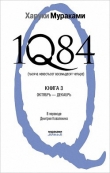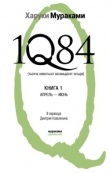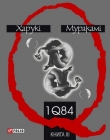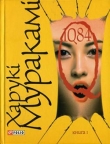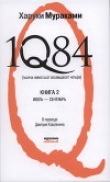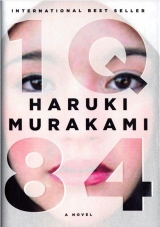
Текст книги "1q84"
Автор книги: Haruki Murakami
Жанр:
Современная проза
сообщить о нарушении
Текущая страница: 73 (всего у книги 81 страниц)
The next envelope contained various records from his father’s days as an NHK fee collector. A record of the times when he was the top producer of the year. Several simple certificates. A photo apparently taken with a colleague on a company trip. An old ID card. Records of payment to his retirement plan and health insurance.… Though his father worked like a dog for NHK for over thirty years, the amount of material left was surprisingly little—next to nothing when compared with Tengo’s achievements in elementary school. Society might see his father’s entire life as amounting to almost zero, but to Tengo, it wasn’t next to nothing. Along with a postal savings book, his father had left behind a deep, dark shadow.
There was nothing in the envelope to indicate anything about his father’s life before he joined NHK. It was as if his father’s life began the moment he became an NHK fee collector.
He opened the final envelope, a thin one, and found a single black-and-white photograph. That was all. It was an old photo, and though the contrast hadn’t faded, there was a thin membrane over the whole picture, as if water had seeped into it. It was a photo of a family—a father, a mother, and a tiny baby. The baby looked less than a year old. The mother, dressed in a kimono, was lovingly cradling the baby. Behind them was a torii gate at a shrine. From the clothes they had on, it looked like winter. Since they were visiting a shrine, it was most likely New Year’s. The mother was squinting, as if the light were too bright, and smiling. The father, dressed in a dark coat, slightly too big for him, had frown lines between his eyes, as if to say he didn’t take anything at face value. The baby looked confused by how big and cold the world could be.
The young father in the photo had to be Tengo’s father. He looked much younger, though he already had a sort of surprising maturity about him, and he was thin, his eyes sunken. It was the face of a poor farmer from some out-of-the-way hamlet, stubborn, skeptical. His hair was cut short, his shoulders a bit stooped. That could only be his father. This meant that the baby must be Tengo, and the mother holding the baby must be Tengo’s mother. His mother was slightly taller than his father, and had good posture. His father was in his late thirties, while his mother looked to be in her mid-twenties.
Tengo had never seen the photograph before. He had never seen anything that could be called a family photo. And he had never seen a picture of himself when he was little. They couldn’t afford a camera, his father had once explained, and never had the opportunity to take any family photos. And Tengo had accepted this. But now he knew it was a lie. They had taken a photo together. And though their clothes weren’t exactly luxurious, they were at least presentable. They didn’t look as if they were so poor they couldn’t afford a camera. The photo was taken not long after Tengo was born, sometime between 1954 and 1955. He turned the photo over, but there was no date or indication of where it had been taken.
Tengo studied the woman. In the photo her face was small, and slightly out of focus. If only he had a magnifying glass! Then he could have made out more details. Still, he could see most of her features. She had an oval-shaped face, a small nose, and plump lips. By no means a beauty, though sort of cute—the type of face that left a good impression. At least compared with his father’s rustic face she looked far more refined and intelligent. Tengo was happy about this. Her hair was nicely styled, but since she had on a kimono, he couldn’t tell much about her figure.
At least as far as they looked in this photo, no one could call them a well-matched couple. There was a great age difference between them. Tengo tried to imagine his parents meeting each other, falling in love, having him—but he just couldn’t see it. You didn’t get that sense at all from the photo. So if there wasn’t an emotional attachment that brought them together, there must have been some other circumstances that did. No, maybe it wasn’t as dramatic as the term circumstances made it sound. Life might just be an absurd, even crude, chain of events and nothing more.
Tengo tried to figure out if the mother in this photo was the mysterious woman who appeared in his daydreams, or in his fog of childhood memories. But he realized he didn’t have any memories of the woman’s face whatsoever. The woman in his memory took off her blouse, let down the straps of her slip, and let some unknown man suck her breasts. And her breathing became deeper, like she was moaning. That’s all he remembered—some man sucking his mother’s breasts. The breasts that should have been his alone were stolen away by somebody else. A baby would no doubt see this as a grave threat. His eyes never went to the man’s face.
Tengo returned the photo to the envelope, and thought about what it meant. His father had cherished this one photograph until he died, which might mean he still cherished Tengo’s mother. Tengo couldn’t remember his mother, for she had died from illness when he was too young to have any memories of her. According to the lawyer’s investigation, Tengo was the only child of his mother and his father, the NHK fee collector, a fact recorded in his family register. But official documents didn’t guarantee that that man was Tengo’s biological father.
“I don’t have a son,” his father had declared to Tengo before he fell into a coma.
“So, what am I?” Tengo had asked.
“You’re nothing,” was his father’s concise and peremptory reply.
His father’s tone of voice had convinced Tengo that there was no blood connection between him and this man. And he had felt freed from heavy shackles. As time went on, however, he wasn’t completely convinced that what his father had said was true.
I’m nothing, Tengo repeated.
Suddenly he realized that his young mother in the photo from long ago reminded him of his older girlfriend. Kyoko Yasuda was her name. In order to calm his mind, he pressed his fingers hard against the middle of his forehead. He took the photo out again and stared at it. A small nose, plump lips, a somewhat pointed chin. Her hairstyle was so different he hadn’t noticed at first, but her features did somewhat resemble Kyoko’s. But what could that possibly mean?
And why did his father think to give this photo to Tengo after his death? While he was alive he had never provided Tengo with a single piece of information about his mother. He had even hidden the existence of this family photo. One thing Tengo did know was that his father never intended to explain the situation to him. Not while he was alive, and not even now after his death. Look, here’s a photo, his father must be saying. I’ll just hand it to you. It’s up to you to figure it out.
Tengo lay faceup on the bare mattress and stared at the ceiling. It was a painted white plywood ceiling, flat with no wood grain or knots, just several straight joints where the boards came together—the same scene his father’s sunken eyes must have viewed during the last few months of life. Or maybe those eyes didn’t see anything. At any rate his gaze had been directed there, at the ceiling, whether he had been seeing it or not.
Tengo closed his eyes and tried to imagine himself slowly moving toward death. But for a thirty-year-old in good health, death was something far off, beyond the imagination. Instead, breathing softly, he watched the twilight shadows as they moved across the wall. He tried to not think about anything. Not thinking about anything was not too hard for Tengo. He was too tired to keep any one particular thought in his head. He wanted to catch some sleep if he could, but he was overtired, and sleep wouldn’t come.
Just before six p.m. Nurse Omura came and told him dinner was ready in the cafeteria. Tengo had no appetite, but the tall, busty nurse wouldn’t leave him alone. You need to get something, even a little bit, into your stomach, she told him. This was close to a direct order. When it came to telling people how to maintain their health, she was a pro. And Tengo wasn’t the type—especially when the other person was an older woman—who could resist.
They took the stairs down to the cafeteria and found Kumi Adachi waiting for them. Nurse Tamura was nowhere to be seen. Tengo ate dinner at the same table as Kumi and Nurse Omura. Tengo had a salad, cooked vegetables, and miso soup with asari clams and scallions, washed down with hot hojicha tea.
“When is the cremation?” Kumi asked him.
“Tomorrow afternoon at one,” Tengo said. “When that’s done, I’ll probably go straight back to Tokyo. I have to go back to work.”
“Will anyone else be at the cremation besides you, Tengo?”
“No, no one else. Just me.”
“Do you mind if I join you?” Kumi asked.
“At my father’s cremation?” Tengo asked, surprised.
“Yes. Actually I was pretty fond of him.”
Tengo involuntarily put his chopsticks down and looked at her. Was she really talking about his father? “What did you like about him?” he asked her.
“He was very conscientious, never said more than he needed to,” she said. “In that sense he was like my father, who passed away.”
“Huh,” Tengo said.
“My father was a fisherman. He died before he reached fifty.”
“Did he die at sea?”
“No, he died of lung cancer. He smoked too much. I don’t know why, but fishermen are all heavy smokers. It’s like smoke is rising out of their whole body.”
Tengo thought about this. “It might have been better if my father had been a fisherman too.”
“Why do you think that?”
“I’m not really sure,” Tengo replied. “The thought just occurred to me—that it would have been better for him than being an NHK fee collector.”
“If your father had been a fisherman, would it have been easier for you to accept him?”
“It would have made many things simpler, I suppose.”
Tengo pictured himself as a child, early in the morning on a day when he didn’t have school, heading off on a fishing boat with his father. The stiff Pacific wind, the salt spray hitting his face. The monotonous drone of the diesel engine. The stuffy smell of the fishing nets. Hard, dangerous work. One mistake and you could lose your life. But compared with being dragged all over Ichikawa to collect subscription fees, it would have to be a more natural, fulfilling life.
“But collecting NHK fees couldn’t have been easy work, could it?” Nurse Omura said as she ate her soy-flavored fish.
“Probably not,” Tengo said. At least he knew it wasn’t the kind of job he could handle.
“Your father was really good at his job, wasn’t he?” Kumi asked.
“I think he was, yes,” Tengo said.
“He showed me his award certificates,” Kumi said.
“Ah! Darn,” Nurse Omura said, suddenly putting down her chopsticks. “I totally forgot. Darn it! How could I forget something so important? Could you wait here for a minute? I have something I have to give you, and it has to be today.”
Nurse Omura wiped her mouth with a napkin, stood up, and hurried out of the cafeteria, her meal half eaten.
“I wonder what’s so important?” Kumi said, tilting her head.
Tengo had no idea.
As he waited for Nurse Omura’s return, he dutifully worked his way through his salad. There weren’t many others eating dinner in the cafeteria. At one table there were three old men, none of them speaking. At another table a man in a white coat, with a sprinkling of gray hair, sat alone, reading the evening paper as he ate, a solemn look on his face.
Nurse Omura finally trotted back. She was holding a department-store shopping bag. She took out some neatly folded clothes.
“I got this from Mr. Kawana about a year or so ago, while he was still conscious,” the large nurse said. “He said when he was put in the casket he would like to be dressed in this. So I sent it to the cleaners and had them store it in mothballs.”
There was no mistaking the NHK fee collector’s uniform. The matching trousers had been nicely ironed. The smell of mothballs hit Tengo. For a while he was speechless.
“Mr. Kawana told me he would like to be cremated wearing this uniform,” Nurse Omura said. She refolded the uniform neatly and put it back in the shopping bag. “So I’m giving it to you now. Tomorrow, give this to the funeral home people and make sure they dress him in it.”
“Isn’t it a problem to have him wear this? The uniform was just on loan to him, and when he retired it should have been returned to NHK,” Tengo said, weakly.
“I wouldn’t worry about it,” Kumi said. “If we don’t say anything, who’s going to know? NHK isn’t going to be in a tight spot over a set of old clothes.”
Nurse Omura agreed. “Mr. Kawana walked all over the place, from morning to night, for over thirty years for NHK. I’m sure it wasn’t always pleasant. Who cares about one uniform? It’s not like you’re using it to do something bad or anything.”
“You’re right. I still have my school uniform from high school,” Kumi said.
“An NHK collector’s uniform and a high school uniform aren’t exactly the same thing,” Tengo interjected, but no one took up the point.
“Come to think of it, I have my old school uniform in the closet somewhere too,” Nurse Omura said.
“Are you telling me you put it on sometimes for your husband? Along with white bobby socks?” Kumi said teasingly.
“Hmm—now that’s a thought,” Nurse Omura said, her chin in her hands on the table, her expression serious. “Probably get him all hot and bothered.”
“Anyway …,” Kumi said. She turned to Tengo. “Mr. Kawana definitely wanted to be cremated in his NHK uniform. I think we should help him make his wish come true. Don’t you think so?”
Tengo took the bag containing the uniform and went back to the room. Kumi Adachi came with him and made up the bed. There were fresh sheets, with a still-starchy fragrance, a new blanket, a new bed cover, and a new pillow. Once all this was arranged, the bed his father had slept in looked totally transformed. Tengo randomly thought of Kumi’s thick, luxuriant pubic hair.
“Your father was in a coma for so long,” Kumi said as she smoothed out the wrinkles in the sheets, “but I don’t think he was completely unconscious.”
“Why do you say that?” Tengo asked.
“Well, he would sometimes send messages to somebody.”
Tengo was standing at the window gazing outside, but he spun around and looked at Kumi. “Messages?”
“He would tap on the bed frame. His hand would hang down from the bed and he would knock on the frame, like he was sending Morse code. Like this.”
Kumi lightly tapped the wooden bed frame with her fist.
“Don’t you think it sounds like a signal?”
“That’s not a signal.”
“Then what is it?”
“He’s knocking on a door,” Tengo said, his voice dry. “The front door of a house.”
“I guess that makes sense. It does sound like someone knocking on a door.” She narrowed her eyes to slits. “So are you saying that even after he lost consciousness he was still making his rounds to collect fees?”
“Probably,” Tengo said. “Somewhere inside his head.”
“It’s like that story of the dead soldier still clutching his trumpet,” Kumi said, impressed.
There was nothing to say to this, so Tengo stayed silent.
“Your father must have really liked his job. Going around collecting NHK subscription fees.”
“I don’t think it’s a question of liking or disliking it,” Tengo said.
“Then what?”
“It was the one thing he was best at.”
“Hmm. I see,” Kumi said. She pondered this. “But that might very well be the best way to live your life.”
“Maybe so,” Tengo said as he looked out at the pine windbreak. It might really be so.
“What’s the one thing you can do best?”
“I don’t know,” Tengo said, looking straight at her. “I honestly have no idea.”
CHAPTER 22
Ushikawa
THOSE EYES LOOKED RATHER FULL OF PITY
Tengo showed up at the entrance to the apartment building on Sunday evening, at six fifteen. As soon as he stepped outside he halted and gazed around, as if looking for something. First to the right, then the left. Then from left to right. He looked up at the sky, then down at his feet. But nothing seemed to be out of the ordinary, as far as he was concerned.
Ushikawa didn’t follow him then. Tengo was carrying nothing with him. His hands were stuffed in the pockets of his unpleated chinos. He had on a high-neck sweater and a well-worn olive-green corduroy jacket, and his hair was unruly. A thick paperback book peeped out of a jacket pocket. Ushikawa figured he must be going out to eat dinner in a nearby restaurant. Fine, he decided, just let him go where he wants.
Tengo had several classes he had to teach on Monday. Ushikawa had found this out by phoning the cram school. Yes, a female office worker had told him, Mr. Kawana will be teaching his regular classes from the beginning of the week. Good. From tomorrow, then, Tengo was finally going back to his normal schedule. Knowing him, he probably wouldn’t be going far this evening. (If Ushikawa had followed him that night, he would have found out that Tengo was on his way to meet with Komatsu at the bar in Yotsuya.)
Just before eight, Ushikawa threw on his pea coat, muffler, and knit hat and, looking around him as he did, hurried out of the building. Tengo had not yet returned at this point. If he was really eating somewhere in the neighborhood, it was taking longer than it should. If Ushikawa was unlucky, he might actually bump into him on his way back. But he was willing to run the risk, since there was something he absolutely had to do, and it had to be done now, at this time of night.
He relied on his memory of the route as he turned several corners, passed a few semi-familiar landmarks, and though he hesitated a few times, unsure of the direction, he eventually arrived at the playground. The strong north wind of the previous day had died down, and it was warm for a December evening, but as expected, the park was deserted. Ushikawa double-checked that there was no one else around, then climbed up the slide. He sat down on top of the slide, leaned back against the railing, and looked up at the sky. The moons were there, almost in the same location as the night before. A bright moon, two-thirds full. Not a single cloud nearby. And beside it, a small green, misshapen moon snuggled close.
So it’s no mistake, then, Ushikawa thought. He exhaled and shook his head. He wasn’t dreaming or hallucinating. Two moons, one big, one small, were definitely visible there, above the leafless zelkova tree. The two moons looked like they had stayed put since last night, waiting for him to return to the top of the slide. They knew that he would be back. As if prearranged, the silence around them was suggestive. And the moons wanted Ushikawa to share that silence with them. You can’t tell anybody else about this, they warned. They held an index finger, covered with a light dusting of ash, to their mouths to make sure he didn’t say a thing.
As he sat there, Ushikawa moved his facial muscles this way and that, to make sure there wasn’t something unnatural or unusual about this feeling he was having. He found nothing unnatural about it. For better or for worse, this was his normal face.
Ushikawa always saw himself as a realist, and he actually was. Metaphysical speculation wasn’t his thing. If something really existed, you had to accept it as a reality, whether or not it made sense or was logical. That was his basic way of thinking. Principles and logic didn’t give birth to reality. Reality came first, and the principles and logic followed. So, he decided, he would have to begin by accepting this reality: that there were two moons in the sky.
The rest of it he would think about later. He sat there, trying not to think, completely absorbed in observing the two moons. He tried to get used to the scene. I have to accept these guys as they are, he said to himself. He couldn’t explain why something like this could be possible, but it wasn’t a question he needed to delve into deeply at this point. The question was how to deal with it. That was the real issue. To do so he needed to start by accepting what he was seeing, without questioning the logic of it.
Ushikawa was there for some fifteen minutes. He sat, leaning against the railing of the slide, hardly moving a muscle. Like a diver slowly acclimatizing his body to a change in water pressure, he let himself be bathed in the light from these moons, let it seep into his skin. Ushikawa’s instinct told him this was important.
Finally this small man with a misshapen head stood up, climbed down from the slide, and, completely caught up in indescribable musings, walked back to the apartment building. Things looked a little different from when he came. Maybe it’s the moonlight, he told himself. That moonlight is gradually displacing how things appear. Thanks to this, he took the wrong turn a number of times. Before he walked inside the building he looked up at the third floor to check that Tengo’s lights were still off. Tengo was still out. It didn’t seem likely that he had just gone out to eat someplace nearby. Maybe he was meeting somebody? And maybe that somebody was Aomame. Or Fuka-Eri. Have I let a golden opportunity slip through my fingers? he wondered. But it was too late to worry about it now. It was too risky to tail Tengo every time he went out. Tengo only had to spot him once to bring the whole operation crashing down.
Ushikawa went back to his apartment and removed his coat, muffler, and hat. He opened a tin of corned beef, spread some on a roll, and ate it, standing up in the kitchen. He drank a container of lukewarm canned coffee. Nothing had any taste. He could feel the texture of the food, but he couldn’t taste anything. Whether this was the fault of the food and drink or his own sense of taste, he couldn’t say. Maybe it could be blamed on those two moons. He heard a faint doorbell ring somewhere. A pause, then it rang again. He didn’t care. It wasn’t his chime ringing, but somebody else’s, far away, on a different floor.
He finished his sandwich, drained the coffee, then leisurely smoked a cigarette to bring his mind back to reality. He reconfirmed what it was he had to do here, and sat down behind the camera at the window. He switched on the electric space heater and warmed his hands in front of the orange light. It was Sunday evening, not yet nine. Traffic into and out of the building was sparse, but Ushikawa was determined to see what time Tengo returned.
A moment later a woman in a black down jacket came out of the entrance, a woman he had never seen before. She had on a gray muffler up to her mouth, dark-framed glasses, and a baseball cap—the perfect getup to hide yourself from prying eyes. She was empty-handed and was walking briskly, taking long strides. Instinctively Ushikawa switched on the camera’s motor drive and snapped three quick shots. He had to find out where she was going, but by the time he had gotten to his feet, the woman had reached the road and vanished into the night. Ushikawa frowned and gave up. At the pace she was walking, by the time he got his shoes on and chased after her, it would be too late to catch up.
He did an instant replay in his mind of what he had just seen. The woman was about five feet six inches tall, and wore narrow blue jeans and white sneakers. All her clothes looked strangely brand-new. He would put her at mid-twenties to about thirty. Her hair was stuffed in her collar, so he couldn’t tell how long it was. The puffy down jacket made it hard to tell what sort of figure she had, but judging from her legs, she must be fairly slim. Her good posture and quick pace indicated she was young and healthy. She must be into sports. All these characteristics fit the Aomame that Ushikawa knew about, though he couldn’t make too many assumptions. Still, she seemed to be very cautious. You could tell how tense her whole body was, like an actress being stalked by paparazzi.
Let’s suppose for the moment, he thought, that this was Aomame.
She came here to see Tengo, but Tengo was out somewhere. The lights in his place were off. She came to see him, but there was no answer when she knocked, so she gave up and left. Maybe she was the one who had been ringing the doorbell. But something about this didn’t make sense. Aomame was being pursued, and should be trying to stay out of sight. Why wouldn’t she have called Tengo ahead of time to make sure he would be at home? That way she wouldn’t unnecessarily expose herself to danger.
Ushikawa mulled this over as he sat in front of the camera, but he couldn’t come up with a working hypothesis that made any sense. The woman’s actions—disguising herself in this non-disguise, leaving the place where she was hiding—didn’t fit what Ushikawa knew about her. She was more cautious and careful than that. The whole thing left him befuddled.
Anyhow, he decided he would go to the photo shop near the station tomorrow and develop the film he had taken. This mystery woman should be in the photos.
He kept watch with his camera until past ten, but after the woman left no one else came in or out of the building. The entrance was silent and deserted, like a stage abandoned after a poorly attended performance. Ushikawa was puzzled about Tengo. As far as he knew, he rarely stayed out this late, and he had classes to teach tomorrow. Maybe he had already come home while Ushikawa was out, and had long since gone to bed?
After ten Ushikawa realized how exhausted he was. He could barely keep his eyes open. This was unusual, since he normally kept late hours. Usually he could stay up as late as he needed. But tonight, sleep was bearing down on him from above, like the stone lid of an ancient coffin.
Maybe I looked at those two moons for too long, he thought, absorbed too much of their light. Their vague afterimage remained in his eyes. Their dark silhouettes numbed the soft part of his brain, like a bee stinging and numbing a caterpillar, then laying eggs on the surface of its body. The bee larvae use the paralyzed caterpillar as a convenient source of food and devour it as soon as they’re born. Ushikawa frowned and shook this ominous image from his mind.
Fine, he decided. I can’t wait here forever for Tengo to get back. When he gets back is entirely up to him, and he’ll just go to sleep as soon as he does. He doesn’t have anywhere else to come back to besides this apartment. Most likely.
Ushikawa listlessly tugged off his trousers and sweater and, stripped to his long-sleeved shirt and long johns, slipped into his sleeping bag. He curled up and soon fell asleep. It was a deep sleep, almost coma-like. As he was falling asleep he thought he heard a knock at the door. But by then his consciousness had shifted over to another world and he couldn’t distinguish one thing from another. When he tried, his body creaked. So he kept his eyes shut, didn’t try to figure out what the sound could mean, and once more sank down into the soft muddy oblivion of sleep.
It was about thirty minutes after Ushikawa fell into this deep sleep that Tengo came back home after meeting Komatsu. He brushed his teeth, hung up his jacket—which reeked of cigarette smoke—changed into pajamas, and went to sleep. Until a phone call came at two a.m. telling him that his father was dead.
When Ushikawa awoke, it was past eight a.m., Monday morning, and Tengo was already on the express train to Tateyama, fast asleep to make up for the hours he had missed. Ushikawa sat behind his camera, waiting to catch Tengo on his way to the cram school, but of course he never made an appearance. At one p.m. Ushikawa gave up. He went to a nearby public phone and called the cram school to see if Tengo was teaching his regular classes today.
“Mr. Kawana had a family emergency, so his classes are canceled for today,” the woman on the phone said. Ushikawa thanked her and hung up.
Family emergency? The only family Tengo had was his father. His father must have died. If that was the case, then Tengo would be leaving Tokyo again. Maybe he had already left while I was sleeping. What was wrong with me? I slept so long I missed him.
At any rate, Tengo is now all alone in the world, thought Ushikawa. A lonely man to begin with, he was now even lonelier. Utterly alone. Before he was even two, his mother had been strangled to death at a hot springs resort in Nagano Prefecture. The man who murdered her was never caught. She had left her husband and, with Tengo in tow, had absconded with a young man. Absconded—a quite old-fashioned term. Nobody uses it anymore, but for a certain kind of action it’s the perfect term. Why the man killed her wasn’t clear. It wasn’t even clear if that man had been the one who murdered her. She had been strangled at night with the belt from her robe, in a room at an inn. The man she had been with was gone. It was hard not to suspect him. When Tengo’s father got the news, he came from Ichikawa and took back his infant son.
Maybe I should have told Tengo about this, Ushikawa thought. He has a right to know. But he told me he didn’t want to hear anything about his mother from the likes of me, so I didn’t say anything. Well, what are you going to do? That’s not my problem, it’s his.
At any rate, whether Tengo is here or not, I have to keep up my surveillance of this place, Ushikawa told himself. Last night was that mysterious woman who looked a lot like Aomame. I have no proof it’s her, but there’s a strong possibility it is. That’s what my misshapen head is telling me. And if that woman is Aomame, she’ll be back to visit Tengo before long. She doesn’t know yet that his father has died. These were Ushikawa’s deductions as he mulled over the situation. Tengo must have gotten the news about his father during the night and set off early this morning. And there must be some reason why the two of them couldn’t get in touch by phone. Which means she would definitely be coming back here. Something was so important to her that she would come here, despite the danger. This time he was going to find out where she was going.
Doing so might also begin to explain why there were two moons. This was a fascinating question that Ushikawa was dying to solve. But really it was of secondary importance. His job was to find out where Aomame was hiding, and hand her over, nice and neat, to the creepy Sakigake duo. Until I do so, whether there are two moons or only one, he decided, I have to be realistic. That has always been my strong point. It’s what defines me.
